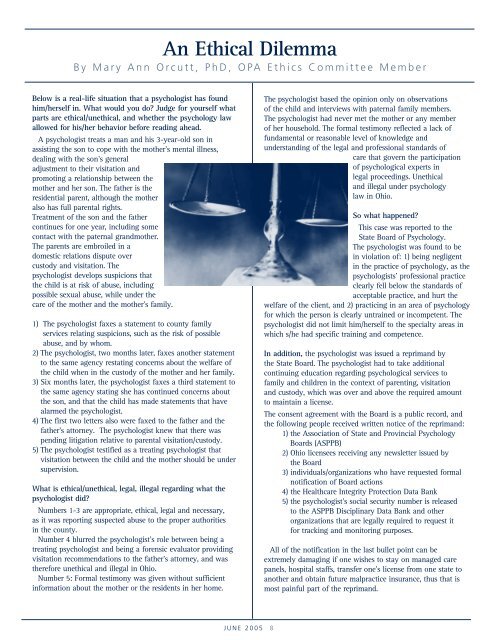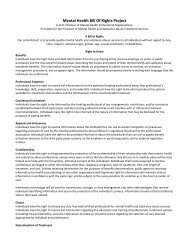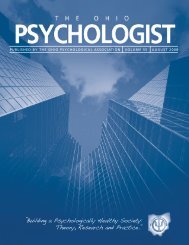The OP Review November 2005 - Ohio Psychological Association
The OP Review November 2005 - Ohio Psychological Association
The OP Review November 2005 - Ohio Psychological Association
Create successful ePaper yourself
Turn your PDF publications into a flip-book with our unique Google optimized e-Paper software.
An Ethical Dilemma<br />
By Mary Ann Orcutt, PhD, <strong>OP</strong>A Ethics Committee Member<br />
Below is a real-life situation that a psychologist has found<br />
him/herself in. What would you do Judge for yourself what<br />
parts are ethical/unethical, and whether the psychology law<br />
allowed for his/her behavior before reading ahead.<br />
A psychologist treats a man and his 3-year-old son in<br />
assisting the son to cope with the mother’s mental illness,<br />
dealing with the son’s general<br />
adjustment to their visitation and<br />
promoting a relationship between the<br />
mother and her son. <strong>The</strong> father is the<br />
residential parent, although the mother<br />
also has full parental rights.<br />
Treatment of the son and the father<br />
continues for one year, including some<br />
contact with the paternal grandmother.<br />
<strong>The</strong> parents are embroiled in a<br />
domestic relations dispute over<br />
custody and visitation. <strong>The</strong><br />
psychologist develops suspicions that<br />
the child is at risk of abuse, including<br />
possible sexual abuse, while under the<br />
care of the mother and the mother’s family.<br />
1) <strong>The</strong> psychologist faxes a statement to county family<br />
services relating suspicions, such as the risk of possible<br />
abuse, and by whom.<br />
2) <strong>The</strong> psychologist, two months later, faxes another statement<br />
to the same agency restating concerns about the welfare of<br />
the child when in the custody of the mother and her family.<br />
3) Six months later, the psychologist faxes a third statement to<br />
the same agency stating she has continued concerns about<br />
the son, and that the child has made statements that have<br />
alarmed the psychologist.<br />
4) <strong>The</strong> first two letters also were faxed to the father and the<br />
father’s attorney. <strong>The</strong> psychologist knew that there was<br />
pending litigation relative to parental visitation/custody.<br />
5) <strong>The</strong> psychologist testified as a treating psychologist that<br />
visitation between the child and the mother should be under<br />
supervision.<br />
What is ethical/unethical, legal, illegal regarding what the<br />
psychologist did<br />
Numbers 1-3 are appropriate, ethical, legal and necessary,<br />
as it was reporting suspected abuse to the proper authorities<br />
in the county.<br />
Number 4 blurred the psychologist’s role between being a<br />
treating psychologist and being a forensic evaluator providing<br />
visitation recommendations to the father’s attorney, and was<br />
therefore unethical and illegal in <strong>Ohio</strong>.<br />
Number 5: Formal testimony was given without sufficient<br />
information about the mother or the residents in her home.<br />
<strong>The</strong> psychologist based the opinion only on observations<br />
of the child and interviews with paternal family members.<br />
<strong>The</strong> psychologist had never met the mother or any member<br />
of her household. <strong>The</strong> formal testimony reflected a lack of<br />
fundamental or reasonable level of knowledge and<br />
understanding of the legal and professional standards of<br />
care that govern the participation<br />
of psychological experts in<br />
legal proceedings. Unethical<br />
and illegal under psychology<br />
law in <strong>Ohio</strong>.<br />
So what happened<br />
This case was reported to the<br />
State Board of Psychology.<br />
<strong>The</strong> psychologist was found to be<br />
in violation of: 1) being negligent<br />
in the practice of psychology, as the<br />
psychologists’ professional practice<br />
clearly fell below the standards of<br />
acceptable practice, and hurt the<br />
welfare of the client, and 2) practicing in an area of psychology<br />
for which the person is clearly untrained or incompetent. <strong>The</strong><br />
psychologist did not limit him/herself to the specialty areas in<br />
which s/he had specific training and competence.<br />
In addition, the psychologist was issued a reprimand by<br />
the State Board. <strong>The</strong> psychologist had to take additional<br />
continuing education regarding psychological services to<br />
family and children in the context of parenting, visitation<br />
and custody, which was over and above the required amount<br />
to maintain a license.<br />
<strong>The</strong> consent agreement with the Board is a public record, and<br />
the following people received written notice of the reprimand:<br />
1) the <strong>Association</strong> of State and Provincial Psychology<br />
Boards (ASPPB)<br />
2) <strong>Ohio</strong> licensees receiving any newsletter issued by<br />
the Board<br />
3) individuals/organizations who have requested formal<br />
notification of Board actions<br />
4) the Healthcare Integrity Protection Data Bank<br />
5) the psychologist’s social security number is released<br />
to the ASPPB Disciplinary Data Bank and other<br />
organizations that are legally required to request it<br />
for tracking and monitoring purposes.<br />
All of the notification in the last bullet point can be<br />
extremely damaging if one wishes to stay on managed care<br />
panels, hospital staffs, transfer one’s license from one state to<br />
another and obtain future malpractice insurance, thus that is<br />
most painful part of the reprimand.<br />
JUNE <strong>2005</strong> 8











